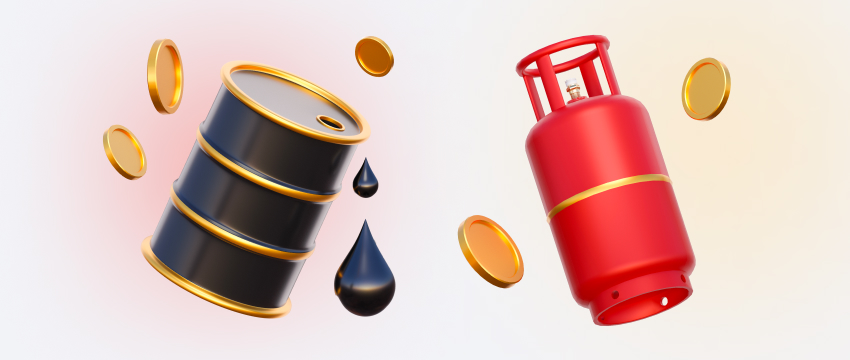Trading commodities online requires a good understanding of what commodities are, how they are categorised, and how the commodity market functions. These are the topics we’ll be exploring in this article.
What are commodities?
Commodities are an asset class composed of raw materials that are separated into four broad groups, namely energy, metal, agricultural and livestock and meat.
Commodities are typically used in the production process to manufacture everyday goods. Examples include grain, corn, coal, oil, natural gas, beef, gold, steel, plastic, and more.
For traders, commodities can be a useful way of diversifying their portfolios. The prices of commodities tend to move in the opposite direction to stocks, so some traders depend on commodities to reduce risk during periods of market volatility.

Categories of commodities
The four commodity groups are usually split into two broad categories:
- Hard commodities: natural resources that need to be mined or extracted, e.g., natural gas, gold, steel, oil
- Soft commodities: livestock or agricultural products that need to be grown, e.g., corn, grain, beef, sugar, coffee
Let’s look at some of these commodities a little closer:
โลหะมีค่า
Includes gold, silver, steel, aluminium, copper, platinum, and palladium. During periods of market volatility or geopolitical uncertainty, some investors turn to invest in precious metals like gold. This is because gold is typically considered a safe-haven asset with real, transferable value. Traders may also trade precious metals as a hedge against periods of high inflation or currency devaluation. Further, precious metals are also considered a diversified investment in that they aren’t associated with other asset classes, potentially limiting exposure to risk.
Energy
Energy commodities play an important role in running the global economy and are essential for survival. Without energy, people and goods cannot be transported across the world, factories can’t be powered and thus homes cannot be heated. However, market prices for commodities in the energy sector are impacted by factors such as advancements in renewable or alternative energy sources (e.g., wind, solar, etc), volatile economic fluctuations, reduced oil outputs globally, and changes to production enforced by OPEC. Energy commodities include crude oil, hydrocarbon gas liquids (e.g., propane), natural gas, coal, etc.
Agricultural
Agricultural commodities include corn, soybeans, wheat, rice, cocoa, coffee, cotton, and sugar. Population growth combined with limited agricultural supply can provide opportunities for investors when prices of agricultural commodities increase. Other factors impacting the global commodities market include extreme weather events, climate change, and geopolitical conflicts.
Livestock and meat
Included in this category of commodities are live cattle, sheep, hogs, pork bellies, feeder cattle, etc. The demand for meat is influenced by several variables like population size, income, changes in consumer habits and supply disruptions. This in turn may result in fluctuations in livestock commodity prices.

Commodity marketplaces
Commodity marketplaces allow for the buying, selling or trade of different types of commodities. Commodities are generally traded in spot markets or derivatives markets.
Spot market
Spot markets are also known as cash markets or physical markets. Financial instruments like commodities are traded for immediate delivery on the spot market. Delivery indicates the exchange of cash for the commodity. Spot trading can take place on exchange or over-the-counter (OTC) markets. Transactions on the spot market typically have a T+2 settlement date.
Derivatives markets
The derivatives market is a financial marketplace that involves using forwards, futures, and options to invest:
- Forwards: a customised agreement between two parties to trade (buy or sell) a financial asset (e.g., commodity) at a future date at a specific price. Forwards can be used for hedging or speculation. They are not traded on a centralised exchange. They are instead seen as OTC instruments. Different types of hard and soft commodities can be traded. Settlement occurs at the end of the contract.
- Futures: a standardised legal agreement to purchase or sell a specific commodity asset at a fixed price at a particular time in the future. It is standardised to enable trading on a futures exchange. A futures contract enables an investor to speculate on the direction of a commodity (long or short) using leverage. Almost any hard or soft commodity can be traded using a futures contract.
- Options: this form of derivative contract offers a buyer the chance to buy or sell an underlying asset at the price stipulated in the contract, within a particular period or at the expiration date of the option.
A quick overview of hedging vs speculation
Hedging and speculation are considered two different forms of investment strategies that attempt to mitigate risk.
Hedging seeks to reduce volatility linked to an asset price by taking an opposite position. Think of it as a form of insurance to offset the risk of any adverse price movements.
Speculative trading on the other hand is when a financial transaction that holds a significant risk of losing value is undertaken because there is also an expectation of a substantial gain (to offset the loss).
Why trade commodities?
For one, commodities are ideal for trading using CFDs (Contracts for Difference). This form of trading is considered to be one of the most effective ways to participate in the commodity markets as access to leverage enables a trader to use less capital but still gain greater exposure to the underlying instrument. However, remember that while leverage can increase your potential profits, it can also amplify potential losses.
Furthermore:
- most commodity markets are open on almost a 24-hour basis which is when CFDs are usually traded
- trading CFDs on commodities offers a way to diversify your portfolio
- with CFDs, you can speculate on the price movements of an underlying commodity without owning or taking physical delivery of the commodity

What are the benefits of trading commodities?
Commodity trading offers two key advantages: diversification and a hedge against inflation and geopolitical risks:
- Diversification: commodities trading offers a great way to diversify your portfolio and hedge against risks as the prices of commodities may move in the opposite direction to other assets such as stocks.
- Hedge against inflation: High inflation usually pushes up the prices of commodities, so investing in commodities can provide a hedge from the effects of inflation. Commodities can also act as a hedge against geopolitical events that can interrupt the supply chain leading to their scarcity.
How to start trading commodities online
Your first step to trading commodities online is to open a commodities trading account. You can choose an instrument of your choice based on your knowledge and expertise of a specific commodity. Keep in mind that some brokers will require a minimum deposit so that transactions can be made via the account.
Many traders begin their trading journey by utilising an online commodities trading platform. They start slowly, gain enough practice, and put their knowledge and skills to the test. Further, CFD trading on commodities is commonly performed through a reputable broker who can offer the right tools and education for traders to trade effectively as well as to ensure that traders’ requirements are met.
Disclaimer: This material is for general informational & educational purposes only and should not be considered as investment advice or an investment recommendation. T4Trade is not responsible for any data provided by third parties referenced or hyperlinked, in this communication.



